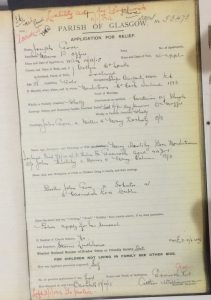The country in whose records we do most of our research was the United Kingdom of Great Britain and Ireland. It broke apart a century ago, and the two leftover bits may have cultivated wilful blindness towards each other since, but that can’t change the fact that the Irish Sea was effectively an inland lake, providing cheap and easy transport between the two islands. It was simpler and more comfortable to travel from Dublin to Liverpool than to Kilkenny.
What brings this to mind is a recent training trip to Glasgow, organised by my professional association, Accredited Genealogists Ireland.

The city itself is wonderful. I’m happy to report that the traditional Glasgow salutation is not, as I had believed, the headbutt (pace Rab C. Nesbitt). But the accent should be a Unesco World Heritage Artifact, with its swallowed consonants and vowels stretched over three syllables, all packed into in a singing lilt that hits stresses in exactly the wrong places. The quintessentially English “Keep calm and carry on” translates into Glaswegian as “Keep calm and ge’ oan wae i'”.

The highlight of the visit was the Mitchell Library and in particular a talk (in unsubtitled Glaswegian) on Glasgow Poor Law records by Senior Archivist, Irene O’Brien. The first and most important point she made was that, despite the name, there was almost no similarity with the Irish or English Poor Law. What Glasgow had from 1845 was more akin to an all-encompassing welfare state than the begrudged misery doled out in Irish workhouses. A vast bureaucracy collected huge quantities of information on the families of applicants, who could be widows, unemployed, sick, orphans … And they’re all in the Mitchell.
For most of the nineteenth century, the gravitational pull of the city’s gigantic industrial employers drew in thousands upon thousands of migrants, from Russia, India, Poland, Italy and above all rural Ireland, rural Ulster especially. So these Poor Law Applications hold information on Irish families from well before the start of Irish civil registration or church registers. And not just names, also locations, in-laws, work histories, even little character assassinations: “an awful boozer”.
Accessing them in the Mitchell is simplicity itself. The entire fifth floor is given over to archives and family history, a database name-index pinpoints the original files, the record delivery is fast and efficient.
But … the only point of access is physically in Glasgow. There is no way to check online before visiting whether the files reference a particular family (though any family with connections in the city will almost certainly appear, even if only through a tangential branch).
I think this might have to do with the fact for Glaswegians, the city is the centre of the universe, a universe that looks very like Glasgow. It’s understandable, but a mistake. Having even the names index online would draw in many more researchers.
It’s a nae-brainer.
Several years ago I brought two assistants with me…from the US…to help research my Tyrone McLaughlin and Slevin families presence in Glasgow…from before the famine till the 1920s…
After several days of frustrating rules…and simple disrespect by the staff of the Mitchell …we left quite dissatisfied and unfulfilled..
Please do not confuse the standards of care at Proni…with the odd actions at the Mitchell..
My Dads family are McLaughlin & Burnett from Tyrone also.
What Irene O’Brien doesn’t know about Poor Law Records in Glasgow isn’t worth knowing. Don’t forget about Paisley across the Clyde. Separate Poor Law Union and a separate civil administration right up to the twenties. Paisley Archives does have an index online to their Poor Law Registers and there are thousands of Irish mentioned. This are south of the Clyde was home to lots of industrial sites, including the massive Shieldhall leather factory which drew in lots of Irish migrants, my own Irish ancestors included. Check out that index for yourself and you might hit paydirt – my bigamous 3xGGfather was discovered thus!
Do these records cover just Glasgow itself or the region? My ancestors migrated from Fermanagh to towns a few miles south of Glasgow, particularly Bothwell & Motherwell. Would Irish in those towns be in the Glaswegian records?
What a shame when I visited the Mitchell library, I did not know about my Irish connections or I would have gone to the 5th floor! My then Glaswegian neighbour took me and although I didn’t find what I was looking for I should have explored the facility in more depth.